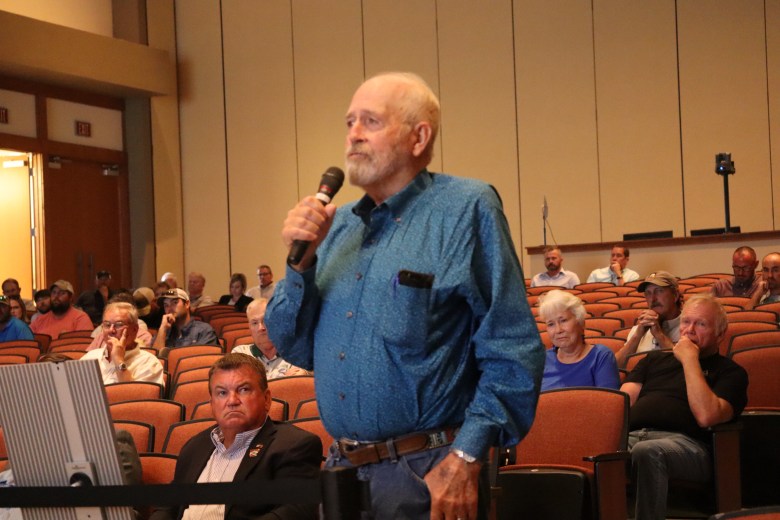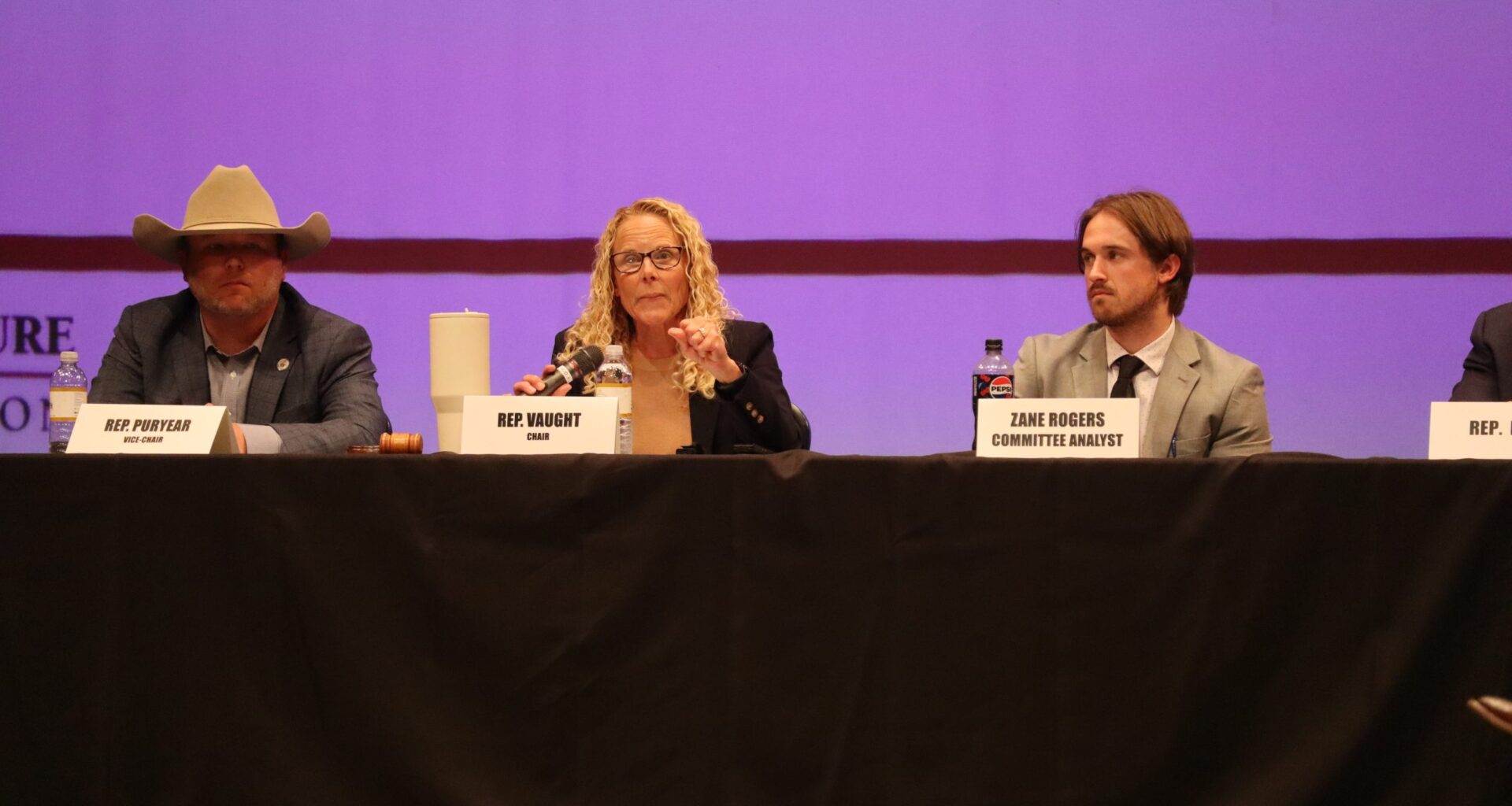During a high-profile hearing of the Arkansas Legislature in Stuttgart on Tuesday, state lawmakers pledged their support for an ailing Delta farm economy, calling on Congress to pass emergency aid for farmers.
Phillips County Community College campus in Stuttgart hosted the two-hour hearing with the help of Riceland Foods and their executive vice president, Ben Noble, who moderated the event and introduced each speaker. The event featured speakers from Arkansas’ agriculture community, including researchers, industry leaders and farmers, all of whom implored policymakers to ameliorate economic losses for row crop farmers that are shaking Arkansas’s largest industry. The meeting may be a sign of a broader national trend as well, as it followed a similar meeting in the small town of Brooklyn outside Jonesboro, where dozens of farmers gathered to request federal aid from congressional staffers.
The House subcommittee on Agriculture, Natural Resources, and Forestry led by State Representative DeAnn Vaught (R-Horatio) held the hearing, and University of Arkansas Division of Agriculture economist Hunter Biram painted a dire picture for row crop agriculture common in the Delta.
Using a series of charts and graphs, Biram explained the Arkansas economy is uniquely dependent on the agricultural sector for overall economic growth, even while the row crop farms prevalent in the Arkansas Delta have struggled to break even over the last three seasons, even with federal support. Without a major infusion of aid, the 2026 harvest is also projected to deliver a fourth year of economic losses for Delta farmers.
Family farm bankruptcies and farm auctions have been skyrocketing in row crop country throughout 2025, especially in the Arkansas Delta, according to data being compiled by economists at the extension service. Many industry leaders and farmers fear more are to come if Congress does not provide additional emergency aid.
 Agriculture economist Hunter Biram presents at a hearing of the State Legislature on the ailing Delta farm economy. Credit: Phillip Powell / Arkansas Times
Agriculture economist Hunter Biram presents at a hearing of the State Legislature on the ailing Delta farm economy. Credit: Phillip Powell / Arkansas Times
“For the most part agriculture tends to be a breakeven business, at least with the row crops,” Biram said. “In 2020, 2021, and 2022, we were coming out of a pandemic and there was a lot of demand driving prices higher,” he added “But since then, we’ve seen those prices decline as we’ve continued to produce and produce really well and demand has stayed stagnant across row crop commodities.”
Biram’s full presentation is below.
Congress recently passed updates to the safety net for commodity growers via provisions in President Trump’s One Big Beautiful Bill, thanks in part to Senator John Boozman, who chairs the influential Senate Agriculture Committee. But those updated supports to crop subsidies, insurance and conservation programs will start providing increased payments to farmers toward the end of 2026, which Biram said was a problem because farmers are about to start applying for loans for the coming season. By the time the aid comes through, many farms may already be cut off from loans they need to start farming next year.
At the end of 2024, Congress passed emergency aid for farmers in a bill designed to keep the government open. Some groups, like the Agricultural Council of Arkansas, are lobbying Washington policymakers to create a similar program that uses some of the revenue from President Trump’s tariffs to provide aid for farmers’ market losses. That would be a similar aid approach to how the Trump Administration bailed out farmers in his first term through the Market Facilitation Program.
Toward the end of Tuesday’s meeting, a few farmers made emotional pleas to state legislators about the importance of agriculture to Arkansas and to them and their families. Sydney Robinette, a fifth-generation rice farmer explained why farming is important to him.
“My family started farming right after the turn of the twentieth century about five miles from here. Farming is a special deal, and if you talk to people who don’t really know about agriculture they ask you why do you do it? Part of the reason is I like feeding people, part of the reason is that I like being outside, and part of the reason is that it’s in my blood,” Robinette said. “The worst part of the farm crisis is the uncertainty, and for me, I know one thing for sure. I’ve got two young children, and if there is one thing I am certain about is that I am meant to provide for them, look out for their wellbeing and raise them into the next important people in our society. All I care about is leaving a better life for them. I don’t want to look back and say I tried my hardest and have to say it wasn’t good enough.”
 Young Stuttgart rice farmer Sydney Robinette implores policymakers to do more to support farmers. Credit: Phillip Powell / Arkansas Times
Young Stuttgart rice farmer Sydney Robinette implores policymakers to do more to support farmers. Credit: Phillip Powell / Arkansas Times
Robinette and Biram both noted that every crop Delta farmers produce — soybeans, corn, rice, and cotton — are money losers this year as a major global glut of the products drives prices down. The uncertainty around tariffs and trade deals are making the problem worse for most farmers.
An older farmer, David Hillman, spoke about how having a stable base of farmers in the country is integral to national security, making the issues in farm country relevant to all. Hillman previously served in the Arkansas House of Representatives, and has farmed in the Stuttgart area since the 1960s.
 Arkansas farmer David Hillman speaks at a hearing by the State Legislature to discuss the farm crisis embroiling the Delta. Credit: Phillip Powell / Arkansas Times
Arkansas farmer David Hillman speaks at a hearing by the State Legislature to discuss the farm crisis embroiling the Delta. Credit: Phillip Powell / Arkansas Times
“I don’t know what you can do to help us, but we need help and we need it now. I don’t know if agriculture is owed anything by the government, but the people of this country are owed something by the government,” Hillman said. “The constitution says the government should provide for the common defense of this nation. We have an obligation to the agricultural community as a nation to make sure that we have a reliable food supply in the United States.”
Most Arkansas agricultural commodities are destined for export, with China having served as a major importer of American corn and soybeans for years. But row crops also serve as the base for domestic livestock feed, especially for the large Arkansas poultry industry, and cotton is integral to global clothing supply chains.
Solutions for the ailing Arkansas row crop economy are difficult to find. Prices for the commodities are falling due to global competition and oversupply, and there is little infrastructure in place for Arkansas farmers to grow crops other than rice, soybeans, corn, and cotton. In an ongoing trade conflict, China has an immense amount of leverage over United States farmers as a major importer of agricultural goods, even if the United States has leverage over China in other areas.
While farmers continue to proudly grow record yields, in an interconnected global marketplace for commodities, increased supply means prices will stay down.
In 2023, Arkansas exported $1.1 billion worth of soybeans, $868 million worth of rice, and $583 million worth of cotton to other countries. Recently, Governor Sarah Sanders and Arkansas Agriculture Secretary Wes Ward announced they had reached a trade deal with Taiwan’s leading agriculture associations to buy $5.56 billion worth of Arkansas and United States corn and soybean products between 2026 and 2029.
Though they did not specify how much of that deal would go to Arkansas farmers, the announcement by Sanders and Ward goes with a larger announcement by the U.S. Department of Agriculture that Taiwan would buy $10 billion worth of agriculture products over the next four years, including soybeans, corn, wheat, and beef.
How state legislators could help address these issues was not completely clear. At the conclusion of the hearing, Vaught said the committee would work to pass a resolution asking the White House and Congress for immediate aid for Arkansas farmers. Some industry leaders also asked for state tax relief on fuel and other inputs farmers use.
“We know this is a dire situation, we have been talking about it for several weeks,” Vaught said. “I wanted us to put this meeting together because I don’t think people truly understand the trickle down: we are in a perfect storm right now where a tsunami could hit Arkansas in its agricultural land,” she said.
Vaught stressed that she understood what the farmers were going through.
“My heart actually breaks for y’all,” she said. “Being someone who is in the farming business, I know what it is like to go to bed and not know about the next day or the next week. And I want to thank you because I know it is long, hard hours where you are not getting anything right now. But you love what you do, and it’s a calling for your life. So I want to thank y’all for doing everything you can to hang in there.”
